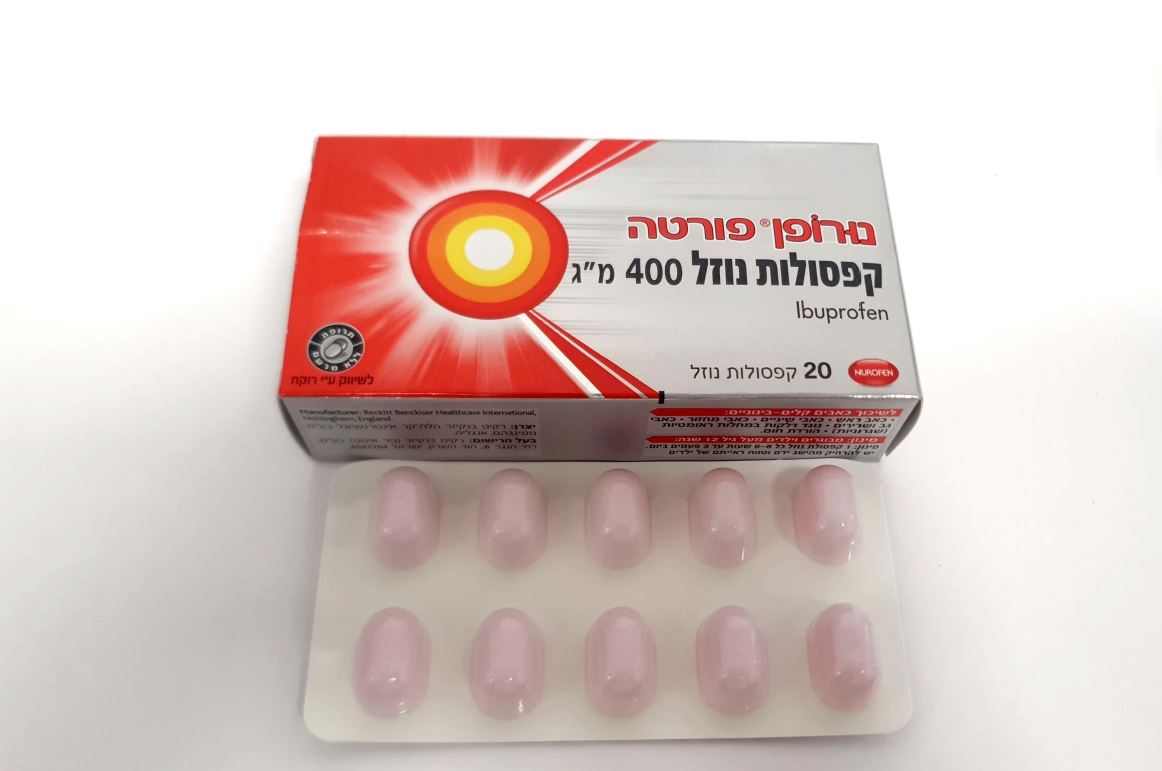Quest for the right Drug

נורופן פורטה קפסולות נוזל 400 מ"ג NUROFEN FORTE LIQUID CAPSULES 400 MG (IBUPROFEN)
תרופה במרשם
תרופה בסל
נרקוטיקה
ציטוטוקסיקה
צורת מתן:
פומי : PER OS
צורת מינון:
קפסולות ממולאות נוזל : CAPSULES LIQUID FILLED
עלון לרופא
מינוניםPosology התוויות
Indications תופעות לוואי
Adverse reactions התוויות נגד
Contraindications אינטראקציות
Interactions מינון יתר
Overdose הריון/הנקה
Pregnancy & Lactation אוכלוסיות מיוחדות
Special populations תכונות פרמקולוגיות
Pharmacological properties מידע רוקחי
Pharmaceutical particulars אזהרת שימוש
Special Warning עלון לרופא
Physicians Leaflet
Interactions : אינטראקציות
4.5 Interaction with other medicinal products and other forms of interaction Ibuprofen (like other NSAIDs) should be avoided in combination with: Aspirin (acetylsalicylic acid): Concomitant administration of ibuprofen and acetylsalicylic acid is not generally recommended because of the potential of increased adverse effects, unless low-dose aspirin (not above 75mg daily) has been advised by a doctor (see section 4.4). Experimental data suggest that ibuprofen may competitively inhibit the effect of low dose aspirin (acetylsalicylic acid) on platelet aggregation when they are dosed concomitantly. Although there are uncertainties regarding extrapolation of these data to the clinical situation, the possibility that regular, long-term use of ibuprofen may reduce the cardioprotective effect of low-dose acetylsalicylic acid cannot be excluded. No clinically relevant effect is considered to be likely for occasional ibuprofen use (see section 5.1). Other NSAIDs including cyclooxygenase-2 selective inhibitors. Avoid concomitant use of two or more NSAIDs as this may increase the risk of adverse effects (see section 4.4). Ibuprofen should be used with caution in combination with: • Corticosteroids: As these may increase the risk of gastrointestinal ulceration or bleeding (see section 4.4). • Antihypertensives (ACE inhibitors and Angiotensin II Antagonists) and diuretics: Since NSAIDs may diminish the effects of these drugs. In some patients with compromised renal function (e.g. dehydrated patients or elderly patients with compromised renal function) the co-administration of an ACE inhibitor or Angiotensin II antagonist and agents that inhibit cyclo-oxygenase may result in further deterioration of renal function, including possible acute renal failure, which is usually reversible. These interactions should be considered in patients taking a coxib concomitantly with ACE inhibitors or angiotensin II antagonists. Therefore, the combination should be administered with caution, especially in the elderly. Patients should be adequately hydrated and consideration should be given to monitoring of renal function after initiation of concomitant therapy, and periodically thereafter. Diuretics can increase the risk of nephrotoxicity of NSAIDs. • Anticoagulants: NSAIDs may enhance the effects of anticoagulants, such as warfarin (see section 4.4). • Antiplatelet agents and selective serotonin reuptake inhibitors (SSRIs): These can increase the risk of gastrointestinal bleeding (see section 4.4). • Cardiac glycosides: NSAIDs may exacerbate cardiac failure, reduce GFR and increase plasma glycoside levels. • Lithium: There is evidence for potential increase in plasma levels of lithium. • Methotrexate. There is evidence for the potential increase in plasma levels of methotrexate. • Ciclosporin: Increased risk of nephrotoxicity. • Mifepristone: NSAIDs should not be used for 8-12 days after mifepristone administration as NSAIDs can reduce the effect of mifepristone. • Tacrolimus: Possible increased risk of nephrotoxicity when NSAIDs are given with tacrolimus. • Zidovudine: Increased risk of haematological toxicity when NSAIDs are given with zidovudine. There is evidence of an increased risk haemarthroses and haematoma in HIV (+) haemophiliacs receiving concurrent treatment with zidovudine and ibuprofen. • Quinolone antibiotics: Animal data indicate that NSAIDs can increase the risk of convulsions associated with quinolone antibiotics. Patients taking NSAIDs and quinolones may have an increased risk of developing convulsions.

שימוש לפי פנקס קופ''ח כללית 1994
Rheumatoid arthritis & osteoarthritis, mild to moderate pain, dysmenorrhea
תאריך הכללה מקורי בסל
01/01/1995
הגבלות
תרופה שאושרה לשימוש כללי בקופ'ח
מידע נוסף
